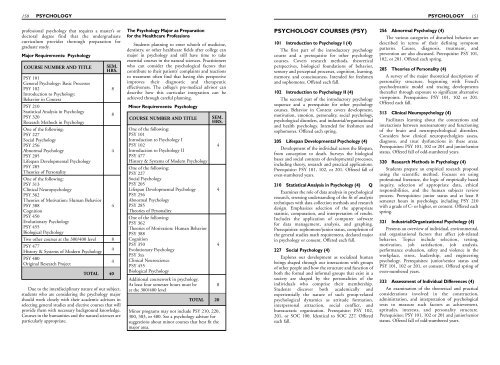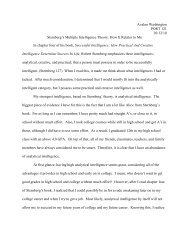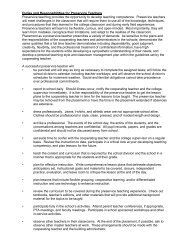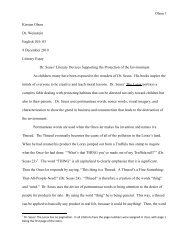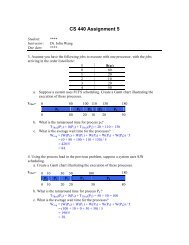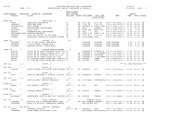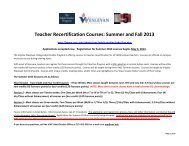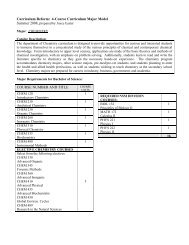148 PROFESSIONAL DEVELOPMENT SERIESPSYCHOLOGY149PROFESSIONALDEVELOPMENT SERIESProfessional Development Series (PDS) listingscontain non-degree courses, workshops, and seminarsdesigned for individuals in public/private education,business, government, and other career areas.Teachers can use course offerings for <strong>Virginia</strong>Department of Education license recertification orfor insight and preparation in the National BoardCertification process. Questions about these coursesshould be directed to Mr. Thomas R. Farley in theAdult Studies Program office.PROFESSIONAL DEVELOPMENTSERIES COURSES (PDS)NB1 Professional Development andPre-Candidacy for National BoardCertification (4 non-degree sem. hrs.)Teachers will investigate best-teaching practicesacross the curricula and grade levels, K-12. Tailored tomeet individual needs, teachers will explore strategiesto improve their teaching and to impact studentlearning while they become familiar with the goals ofthe National Board for Professional TeachingStandards. This course is not a requirement of theNational Board certification process. This is a gradedcourse. Offered each semester and Summer Session.NB2 Personalized Professional Growthand National Board Certification(1-3 non-degree sem. hrs.)Teachers engage in a guided study centered on apersonal professional development program workingfrom an overview of the candidate process and guidedby the mission, goals, and processes of the NationalBoard for Professional Teaching Standards. Theyinvestigate “best teaching practices” across thecurricula and grade levels, K-12. Covers portfoliorequirements and assessment center exercises,including video taping your class for NBPTS review,descriptive, analytical and reflective writing styles,NBPTS Assessment Center exercises, and collectedstudent work samples. Skills such as questioning,differentiated instructional strategies, and portfoliomaintenance are developed and revised. Pass/failgrading. Offered each semester.NB3 National Board Standards in YourClassroom (1 non-degree sem. hr.)Designed for individuals who are currentlyteaching in a classroom setting. Introduces teachers tothe mission, goals, and processes of the NationalBoard for Professional Teaching Standards. Theyexplore and determine their levels of interest inseeking National Board Certification. While thecourse encourages teachers to seek National BoardCertification, it serves as an opportunity for teachersto consider strategies to improve their teaching and toimpact student learning. They investigate anddemonstrate “best teaching practices” across theirspecific curricula and grade level (K-12) through useof professional journals and reference materials,production of a professional reading report, designingand executing a content improvement plan,videotaping a lesson, implementing newdifferentiated instructional strategies, and creating anessay about the video-taped lesson with learningstrategy implementation using descriptive, analyticaland reflective writing. Pass/fail grading. Offered eachsemester and Summer Session.NB4 Take One Candidate SupportWorkshop (2 non-degree sem. hrs.)Designed to fine-tune the skills developed duringthe PDS-NB1 course. Topics include the CorePropositions, videotaping, effective instructionalpractices and writing an entry. Included in classdiscussions is appropriate alignment to nationalcurriculum standards as well as NBPTS standardsapplicable to the Take One! Entry. Teachers completethe Take One! Entry. Pass/fail grading. Offered eachsemester.PDS NB5 Professional Developmentfor National Board Certification -Completing the Journey(1 non-degree sem. hr.)Teachers focus on the final details of the portfolioentry and become familiar with the assessment centerexercises. Focuses on peer review and collegiatecollaboration as the portfolio is prepared forfinalization. They investigate content-specific to theircertification and the alignment to national standards.Serves as an opportunity for teachers to criticallyconsider strategies to improve their teaching and toimpact student learning. Pass/fail grading.Prerequisite: PDS NB2. Offered each spring.PDS NB6 National BoardRenewal Workshop (1 non-degreesem. hr.)A series of five class meetings to introduce NBCTrenewal candidates to the renewal process, providesupport as candidates examine their professionalgrowth experiences, and complete their four-partportfolio to demonstrate continued accomplishedteaching. Pass/fail grading. Prerequisite: currentNational Board Certified Teacher (NBCT);approaching ten year renewal within one (1) year.Offered each semester.PDS POLS 1 Women and Politics (2)Examine women in politics from an internationalperspective. Teaching in public schools depends onpolitical negotiations; this course illuminates barriersand opportunities for women working in the publicsphere. Knowing difficulties and advantages womenface allows teachers to equip students with skills,strategies and knowledge to ensure success in agendered world. Prerequisite: teacher recertification.Offered on demand (summer only).PDS POLS 2 Media and Democracy (2)Explores the political effects of the news media.Teachers in public schools play an important role instudents’ development of the skills necessary tobecome a critical media consumer. Familiarity withmedia effects improves teachers’ abilities to helpstudents develop media literacy skills, a necessity indemocratic societies. Prerequisite: teacher recertification.Offered on demand (summer only).PDS PSY Abnormal Psychologyfor Teachers (2 )Addresses common psychological abnormalitiesthat teachers may encounter in the K-12 classroom.Topics will include depression, anxiety, learningdisabilities, ADHD, autism spectrum disorders, andtopics requested by participants. Discussion andassignments will center on relevant classroomstrategies and personal experiences, which will be tiedto psychological literature. Prerequisite: teacherrecertification. Offered on demand (summer only).PDS REC 1 Disabilities in the Media (2)Through the use of popular media teachers willexplore various disabilities, related challenges andprejudices individuals with disabilities mayencounter. Discussion of physical, psychological,emotional, and social disabilities allow forexamination of how disabilities, and interactionsbetween those with and without disabilities, areportrayed in the media. Ideal for special educationand adapted PE teachers. Prerequisite: teacherrecertification. Offered on demand (summer only).PDS REC 2 Outdoor ExperientialEducation and Recreation (2)A series of experiences, discussions, and readingsabout theories, current issues and practices in outdooreducation and recreation. Teachers plan, prepare, andimplement outdoor experiences based on standardsin the field—including strategies to implementkinesthetic learning into their existing and/or newlesson plans and classroom activities. The class willmeet on campus as well as local off campus sites tobe announced. Entrance fees, parking andtransportation are the responsibility of the student.Prerequisite: teacher recertification. Offered ondemand (summer only).PDS SOC 1 Visual Sociology of theCivil Rights Movement (2)Documentary films of the civil rights movementin the United States are used to investigate, discuss,and interpret social movement theories such asresource mobilization, framing, relative deprivation,and political process. Content appropriate forSociology, World History II, U.S. History, andGovernment teachers. Prerequisite: teacherrecertification. Offered on demand (summer only).PDS ENG 1 Perspectives on AmericanLiterature (2 non-degreesem. hr.)Examines the major figures and movements inAmerican letters from the establishment of theEuropean colonies in North America through thepresent day. Emphasis will be on perspectives helpfulin teaching these works in the school classroom.Prerequisite: teacher recertification. Offered ondemand (summer only).PDS ENG 2 African-AmericanLiterature (2 )A series of five class meetings to introduce NBCTrenewal candidates to the renewal process, providesupport as candidates examine their professionalgrowth experiences, and complete their four-partportfolio to demonstrate continued accomplishedteaching. Pass/fail grading. Prerequisite: teacherrecertification. Offered on demand (summer only).PDS LATN 1 Teaching Latin Topicsfor the AP Examination (2)Students read, translate, and discuss texts andaspects of civilization relevant to the teaching of theLatin Advanced Placement Exam. Prerequisite:teacher recertification. Offered on demand (summeronly).PSYCHOLOGYDR. CRAIG C. JACKSONDR. GABRIELA A. MARTORELL, Program CoordinatorDR. TARYN A. MYERSBecause psychology has developed as aninterdisciplinary subject, historically related tophilosophy and biology, it is well suited as a major forstudents seeking a diversified education that willadvance their understanding of themselves andothers. Students desiring to enter a specialty field of
150 PSYCHOLOGYPSYCHOLOGY151professional psychology that requires a master’s ordoctoral degree find that the undergraduatecurriculum provides thorough preparation forgraduate study.Major Requirements: PsychologyCOURSE NUMBER AND TITLESEM.HRS.PSY 101General Psychology: Basic ProcessesPSY 102 8Introduction to Psychology:Behavior in ContextPSY 210Statistical Analysis in Psychology8PSY 320Research Methods in PsychologyOne of the following:PSY 227Social PsychologyPSY 256Abnormal Psychology 4PSY 205Lifespan Developmental PsychologyPSY 285Theories of PersonalityOne of the following:PSY 313Clinical NeuropsychologyPSY 362Theories of Motivation: Human BehaviorPSY 388 4CognitionPSY 450Evolutionary PsychologyPSY 455Biological PsychologyTwo other courses at the 300/400 level 8PSY 4774History & Systems of Modern PsychologyPSY 4804Original Research ProjectTOTAL 40Due to the interdisciplinary nature of our subject,students who are considering the psychology majorshould work closely with their academic advisors inselecting general studies and elective courses that willprovide them with necessary background knowledge.Courses in the humanities and the natural sciences areparticularly appropriate.The Psychology Major as Preparationfor the Healthcare ProfessionsStudents planning to enter schools of medicine,dentistry, or other healthcare fields after college canmajor in psychology and still have time to takeessential courses in the natural sciences. Practitionerswho can consider the psychological factors thatcontribute to their patients’ complaints and reactionsto treatment often find that having this perspectiveimproves their diagnostic and therapeuticeffectiveness. The college’s pre-medical advisor candescribe how this curricular integration can beachieved through careful planning.Minor Requirements: PsychologyCOURSE NUMBER AND TITLESEM.HRS.One of the following:PSY 101Introduction to Psychology IPSY 102 4Introduction to Psychology IIPSY 477History & Systems of Modern PsychologyOne of the following:PSY 227Social PsychologyPSY 205Lifespan Developmental Psychology 4PSY 256Abnormal PsychologyPSY 285Theories of PersonalityOne of the following:PSY 362Theories of Motivation: Human BehaviorPSY 388CognitionPSY 350 4Evolutionary PsychologyPSY 3xxClinical NeurosciencePSY 455Biological PsychologyAdditional coursework in psychology.At least four semester hours must be 8at the 300/400 levelTOTAL 20Minor programs may not include PSY 210, 220,300, 303, or 480. See a psychology advisor forsuggestions about minor courses that best fit themajor area.PSYCHOLOGY COURSES (PSY)101 Introduction to Psychology I (4)The first part of the introductory psychologycourse and a prerequisite for other psychologycourses. Covers research methods, theoreticalperspectives, biological foundations of behavior,sensory and perceptual processes, cognition, learning,memory, and consciousness. Intended for freshmenand sophomores. Offered each fall.102 Introduction to Psychology II (4)The second part of the introductory psychologysequence and a prerequisite for other psychologycourses. Behavior in Context covers development,motivation, emotion, personality, social psychology,psychological disorders, and industrial/organizationaland health psychology. Intended for freshmen andsophomores. Offered each spring.205 Lifespan Developmental Psychology (4)Development of the individual across the lifespan,from conception to death. Surveys the biologicalbases and social contexts of developmental processes,including theory, research and practical applications.Prerequisite: PSY 101, 102, or 201. Offered fall ofeven-numbered years.210 Statistical Analysis in Psychology (4) QExamines the role of data analysis in psychologicalresearch, stressing understanding of the fit of analysistechniques with data collection methods and researchdesign. Emphasizes selection of the appropriatestatistic, computation, and interpretation of results.Includes the application of computer softwarefor data management, analysis, and graphing.Prerequisites: sophomore/junior status, completion ofthe general studies math requirement, declared majorin psychology or consent. Offered each fall.227 Social Psychology (4)Explores our development as socialized humanbeings shaped through our interactions with groupsof other people and how the structure and function ofboth the formal and informal groups that exist in asociety are shaped by the personalities of theindividuals who comprise their membership.Students discover both academically andexperientially the nature of such group-relatedpsychological dynamics as attitude formation,interpersonal attraction, social conflict, andbureaucratic organization. Prerequisite: PSY 102,201, or SOC 100. Identical to SOC 227. Offeredeach fall.256 Abnormal Psychology (4)The various categories of disturbed behavior aredescribed in terms of their defining symptompatterns. Causes, diagnosis, treatment, andprevention are also discussed. Prerequisite: PSY 101,102, or 201. Offered each spring.285 Theories of Personality (4)A survey of the major theoretical descriptions ofpersonality structure, beginning with Freud’spsychodynamic model and tracing developmentsthereafter through exposure to significant alternativeviewpoints. Prerequisites: PSY 101, 102 or 201.Offered each fall.313 Clinical Neuropsychology (4)Facilitates learning about the connections andinteractions between neuroanatomy and functioningof the brain and neuropsychological disorders.Considers how clinical neuropsycholgists assess,diagnose, and treat dysfunctions in these areas.Prerequisites: PSY 101, 102 or 201 and junior/seniorstatus. Offered fall of odd-numbered years.320 Research Methods in Psychology (4)Students prepare an empirical research proposalusing the scientific method. Focuses on usingprofessional literature, the logic of empirically basedinquiry, selection of appropriate data, ethicalresponsibilities, and the human subjects reviewprocess. Prerequisites: junior status and at least 8semester hours in psychology, including PSY 210with a grade of C- or higher, or consent. Offered eachspring.321 Industrial/Organizational Psychology (4)Presents an overview of individual, environmental,and organizational factors that affect job-relatedbehavior. Topics include selection, testing,motivation, job satisfaction, job analysis,performance evaluation, safety and violence in theworkplace, stress, leadership, and engineeringpsychology. Prerequisites: junior/senior status andPSY 101, 102 or 201, or consent. Offered spring ofeven-numbered years.333 Assessment of Individual Differences (4)An examination of the theoretical and practicalconsiderations involved in the construction,administration, and interpretation of psychologicaltests to measure such factors as achievement,aptitudes, interests, and personality structure.Prerequisites: PSY 101, 102 or 201 and junior/seniorstatus. Offered fall of odd-numbered years.


